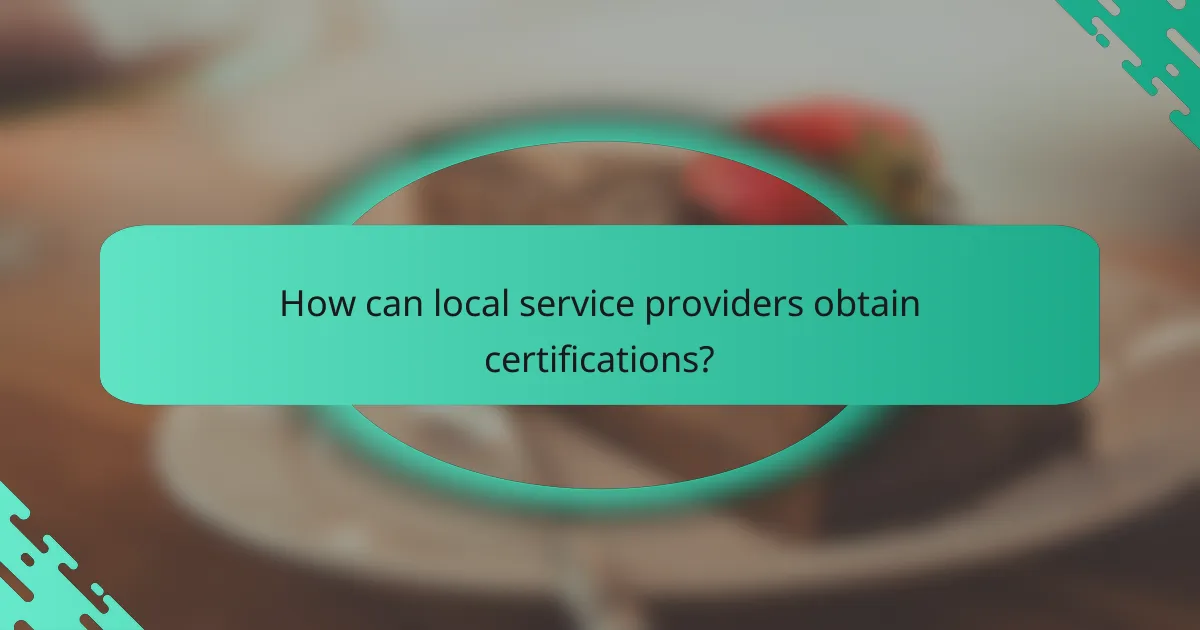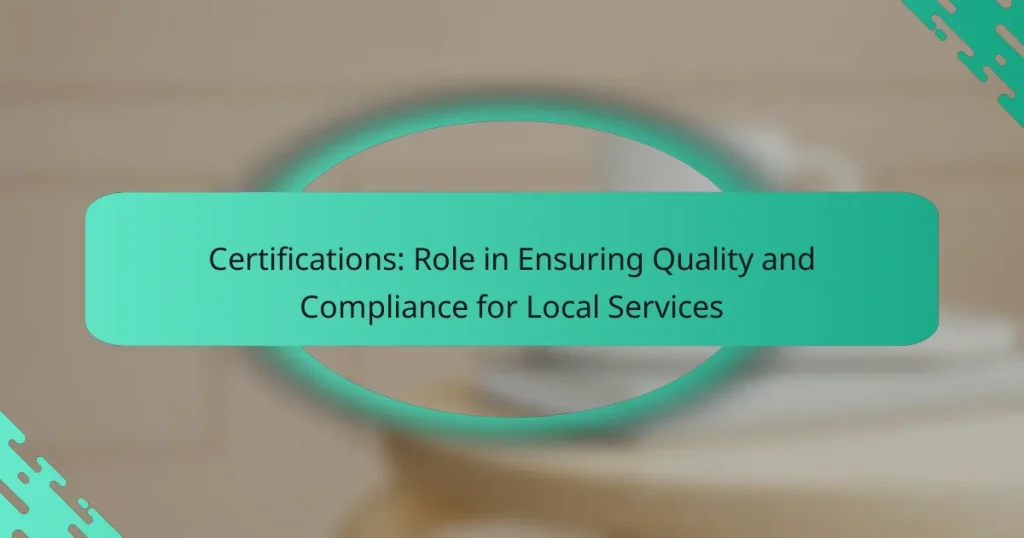Certifications are essential for maintaining quality and compliance in local services, as they set standardized practices that providers must adhere to. By validating that businesses meet specific industry standards, these certifications foster trust and reliability among customers while ensuring consistent service delivery.

How do certifications ensure quality in local services?
Certifications play a crucial role in ensuring quality in local services by establishing standardized practices and benchmarks that service providers must meet. These certifications often require adherence to specific guidelines, which helps maintain consistency and reliability in service delivery.
Improved service standards
Certifications lead to improved service standards by setting clear expectations for quality and performance. Service providers must undergo rigorous assessments and training to obtain certifications, ensuring they are equipped with the necessary skills and knowledge.
For example, a local plumbing service that is certified may follow industry best practices, use high-quality materials, and implement effective safety measures, which ultimately enhances the overall service experience for customers.
Increased customer trust
When a service provider holds a recognized certification, it significantly boosts customer trust. Clients are more likely to choose certified services because they perceive them as reliable and competent.
For instance, a certified electrician is often seen as more trustworthy than an uncertified one, as customers believe that the certification indicates a commitment to quality and safety standards. This trust can lead to repeat business and positive word-of-mouth referrals.
Regulatory compliance
Certifications often ensure that local services comply with relevant regulations and legal requirements. Many industries have specific standards that must be met to operate legally, and certifications help verify compliance with these standards.
For example, in the food service industry, certifications such as HACCP (Hazard Analysis Critical Control Point) are essential for ensuring that establishments adhere to health and safety regulations. This compliance not only protects consumers but also helps businesses avoid legal issues and potential fines.

What types of certifications are relevant for local services?
Certifications play a crucial role in ensuring quality and compliance for local services. They validate that businesses meet specific standards, which can enhance trust and reliability among customers.
ISO certifications
ISO certifications, such as ISO 9001 for quality management, are internationally recognized standards that demonstrate a commitment to quality and continuous improvement. Local services can benefit from these certifications by streamlining operations and enhancing customer satisfaction.
Obtaining ISO certification typically involves a thorough assessment of processes and practices, followed by regular audits to maintain compliance. Businesses should consider the costs and time involved, as well as the potential for increased marketability and customer trust.
Local business licenses
Local business licenses are mandatory permits that allow businesses to operate legally within a specific jurisdiction. These licenses ensure that services comply with local regulations, zoning laws, and health and safety standards.
To obtain a local business license, companies must usually submit an application, pay a fee, and sometimes pass inspections. It is essential to check with local authorities for specific requirements, as these can vary significantly by region and industry.
Industry-specific certifications
Industry-specific certifications are tailored to particular sectors, such as food safety certifications for restaurants or professional certifications for trades like plumbing and electrical work. These certifications ensure that businesses meet industry standards and regulations.
When pursuing industry-specific certifications, businesses should research the relevant requirements and consider the benefits, such as improved credibility and compliance with safety regulations. Engaging with industry associations can provide valuable resources and guidance throughout the certification process.

How can local service providers obtain certifications?
Local service providers can obtain certifications by following a structured process that typically involves submitting an application, providing necessary documentation, and completing required training and assessments. These certifications help ensure compliance with industry standards and enhance service quality.
Application process
The application process for obtaining certifications usually starts with identifying the relevant certifying body and understanding their specific requirements. Providers must fill out an application form and may need to pay a fee, which can vary based on the certification type.
After submitting the application, the certifying body will review it and may request additional information or clarification. It’s crucial to ensure that all information is accurate and complete to avoid delays in processing.
Required documentation
Additionally, some certifications may require specific operational documents, such as safety records or quality assurance protocols. Ensuring that all required documentation is organized and readily available can streamline the application process.
Training and assessment
Training and assessment are essential components of the certification process. Local service providers often need to complete training programs that cover relevant standards and best practices in their industry. These programs can vary in length and format, from online courses to in-person workshops.
Following the training, providers typically undergo an assessment, which may include written tests, practical evaluations, or site inspections. Successfully passing these assessments is critical to obtaining certification and demonstrating competency in delivering quality services.

What are the costs associated with obtaining certifications?
Obtaining certifications involves various costs that can significantly impact local service providers. These costs typically include application fees, training expenses, and renewal fees, which can vary based on the certification type and industry standards.
Application fees
Application fees are the initial costs required to submit a certification request. These fees can range from a few hundred to several thousand dollars, depending on the certification body and the complexity of the certification process.
It’s essential to research the specific fees associated with the certification you are pursuing, as some organizations may offer discounts for early applications or bulk submissions. Be aware of any additional costs that may arise during the application process, such as documentation or assessment fees.
Training costs
Training costs encompass the expenses related to preparing for the certification exam or meeting the required competencies. This can include course fees, study materials, and any necessary workshops or seminars.
Training expenses can vary widely, typically ranging from a few hundred to several thousand dollars. Consider online courses or local training providers that may offer competitive pricing. Investing in quality training can improve your chances of passing the certification exam on the first attempt.
Renewal fees
Renewal fees are the costs associated with maintaining your certification over time. Most certifications require renewal every few years, which often involves a fee that can be similar to the initial application fee.
In addition to renewal fees, you may also need to complete continuing education credits or additional training to keep your certification active. Be proactive in tracking these requirements to avoid lapsing your certification and incurring additional costs for reapplication.

What are the benefits of certifications for local service providers?
Certifications provide local service providers with a framework to demonstrate quality and compliance, enhancing their credibility and operational standards. They can lead to increased customer trust, improved service delivery, and greater market opportunities.
Competitive advantage
Having certifications can set local service providers apart from their competitors. It signals to potential customers that they adhere to recognized standards, which can be a deciding factor in service selection.
For example, a local contractor with ISO certification may attract more clients than one without, as clients often prefer businesses that meet international quality benchmarks. This competitive edge can translate into increased sales and customer loyalty.
Enhanced reputation
Certifications contribute significantly to building a strong reputation in the community. When service providers are certified, it reflects their commitment to maintaining high standards, which can lead to positive word-of-mouth and repeat business.
Additionally, certifications often require regular audits and assessments, ensuring that providers continuously improve their services. This ongoing commitment to quality can enhance their standing in the eyes of both customers and industry peers.
Access to new markets
Certifications can open doors to new markets that may have specific compliance requirements. For instance, government contracts often necessitate certain certifications, making them essential for local service providers looking to expand their client base.
Furthermore, being certified can facilitate entry into international markets, where adherence to global standards is crucial. This can lead to partnerships with larger companies or participation in projects that require certified vendors, significantly broadening business opportunities.


